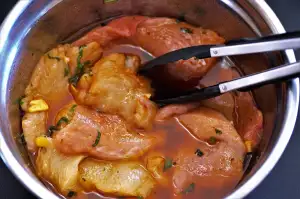Exploring the Best Substitutes for Dry White Wine in Cooking: Unleash the Flavors in Your Dishes!

Dry white wine is a popular ingredient in many recipes, adding depth and complexity to dishes. However, not everyone has access to or prefers to use alcohol in their cooking. Fortunately, there are several alternatives that can be used to achieve similar flavors and enhance the taste of your dishes. In this article, we will explore some of the best substitutes for dry white wine, allowing you to unleash the flavors in your culinary creations without compromising on taste. Whether you're looking for a non-alcoholic option or simply don't have any dry white wine on hand, these alternatives will help you elevate your cooking to new heights.
Option 1: Vegetable or Chicken Broth
When it comes to cooking, vegetable or chicken broth can be an excellent substitute for dry white wine. Both options add depth and flavor to your dishes without the alcohol content.
Vegetable broth is a great choice for vegetarian or vegan recipes. It is made by simmering vegetables, herbs, and spices in water. The result is a flavorful liquid that can enhance the taste of soups, stews, and sauces.
On the other hand, chicken broth adds a savory note to your dishes. It is made by simmering chicken bones, vegetables, and seasonings in water. The rich flavors of the chicken infuse into the broth, making it a versatile ingredient in various recipes.
To use vegetable or chicken broth as a substitute for dry white wine, simply replace the wine with an equal amount of broth. This will maintain the desired liquid consistency while adding a delicious flavor profile to your dish.
Keep in mind that while vegetable or chicken broth can mimic the flavors of dry white wine, they may not provide the same acidity level. If acidity is crucial to your recipe, you can add a small amount of lemon juice or vinegar to balance the flavors.
Next time you're out of dry white wine but still want to enhance the flavors of your dishes, reach for vegetable or chicken broth as an excellent alternative. Your taste buds will thank you!
Option 2: Apple Cider Vinegar
Another great substitute for dry white wine in cooking is apple cider vinegar. This tangy and slightly sweet vinegar adds a unique flavor to your dishes, making them more vibrant and flavorful.
When using apple cider vinegar as a substitute, it's important to dilute it with water to achieve the desired taste. Start by mixing one part apple cider vinegar with three parts water. This will help balance out the acidity and prevent overpowering flavors.
Apple cider vinegar works well in recipes that call for a touch of acidity, such as marinades, dressings, and sauces. It can be used in both savory and sweet dishes, adding a subtle fruity note.
Keep in mind that apple cider vinegar has a distinct flavor profile, so it may not be suitable for every recipe. However, if you're looking to add a tangy kick to your dish without using wine, apple cider vinegar is an excellent option to consider.
Experiment with different ratios of apple cider vinegar and water to find the perfect balance for your taste buds. Remember, a little goes a long way, so start with small amounts and adjust according to your preference.
Next time you're cooking and realize you're out of dry white wine, reach for the bottle of apple cider vinegar instead. You'll be pleasantly surprised by how it elevates the flavors in your dishes while adding a unique twist.
Option 3: Lemon Juice
When it comes to adding a bright and tangy flavor to your dishes, lemon juice is an excellent substitute for dry white wine. Its acidic nature helps to tenderize meat and adds a refreshing zing to sauces and marinades.
To use lemon juice as a replacement, simply squeeze fresh lemon juice into your recipe. Start with a small amount and adjust according to your taste preferences. Keep in mind that lemon juice can be quite strong, so it's best to add it gradually.
Lemon juice works particularly well in seafood dishes, such as shrimp scampi or fish piccata. It pairs beautifully with herbs like dill, parsley, and thyme, enhancing the overall flavors of the dish.
Not only does lemon juice provide a vibrant taste, but it also offers health benefits. Lemons are rich in vitamin C and antioxidants, which can boost your immune system and promote good digestion.
So next time you find yourself without dry white wine in your pantry, reach for a fresh lemon instead. It will bring a burst of flavor to your cooking while keeping things light and refreshing.
Option 4: White Grape Juice
White grape juice is a fantastic substitute for dry white wine in cooking. It provides a similar level of sweetness and acidity, which can enhance the flavors of your dishes. When using white grape juice as a substitute, make sure to choose a high-quality, unsweetened variety to avoid overpowering the dish with excessive sweetness.
White grape juice works particularly well in recipes that require a fruity and slightly tart flavor profile. It pairs wonderfully with poultry, seafood, and light sauces. The natural sugars in the juice caramelize beautifully when cooked, adding depth and complexity to your dishes.
To use white grape juice as a substitute for dry white wine, simply replace the wine with an equal amount of juice. Keep in mind that the alcohol content will be absent in this substitution, so you may need to adjust other ingredients accordingly to maintain the desired balance of flavors.
Experiment with different brands and varieties of white grape juice to find one that complements your dish best. Some juices may have a more pronounced grape flavor, while others may be more subtle. Choose one that aligns with your taste preferences and the overall flavor profile you want to achieve.
Remember that cooking is all about creativity and experimentation. Don't be afraid to try new substitutes like white grape juice to unleash unique flavors in your dishes. Enjoy exploring this alternative option and elevate your culinary creations without dry white wine!
Option 5: White Wine Vinegar
If you're looking for a substitute that can add a tangy and acidic flavor to your dishes, white wine vinegar is an excellent choice. It shares some similarities with dry white wine, making it a suitable replacement in many recipes.
White wine vinegar is made from fermented white wine, which gives it a similar flavor profile to dry white wine. It has a slightly sour taste with hints of fruitiness and acidity. When used in cooking, it can help enhance the flavors of your dishes without overpowering them.
When substituting white wine vinegar for dry white wine in a recipe, you'll need to dilute it with water to achieve the desired balance. For every tablespoon of dry white wine called for in the recipe, use one tablespoon of white wine vinegar mixed with one tablespoon of water.
Keep in mind that white wine vinegar is more acidic than dry white wine, so you may want to adjust the amount according to your taste preferences. Start by using less and gradually increase if needed.
White wine vinegar works well in marinades, dressings, sauces, and soups. It adds brightness and depth to dishes like chicken piccata or shrimp scampi. Its tangy flavor complements seafood, poultry, and vegetables beautifully.
Next time you find yourself without dry white wine while cooking, reach for a bottle of white wine vinegar instead. You'll be pleasantly surprised by how it can elevate the flavors of your dishes and bring them to life!
Option 6: Non-Alcoholic White Wine
For those who prefer to avoid alcohol altogether, non-alcoholic white wine is an excellent substitute for dry white wine in cooking. Made by removing the alcohol content from regular white wine, non-alcoholic versions retain the flavors and aromas that add depth to your dishes.
Non-alcoholic white wine can be used in a 1:1 ratio as a replacement for dry white wine. It provides a similar acidic and fruity taste that enhances the flavors of your food. Whether you're making a creamy risotto or a flavorful sauce, non-alcoholic white wine will contribute to the overall taste profile without compromising on quality.
One advantage of using non-alcoholic white wine is that it maintains the integrity of your dish while catering to dietary restrictions or personal preferences. It's also a great option if you're cooking for children or individuals who cannot consume alcohol.
When selecting non-alcoholic white wine, look for brands that offer high-quality products with authentic flavors. Some options even mimic specific grape varieties, allowing you to experiment with different styles of cooking.
Remember, just because it's non-alcoholic doesn't mean it lacks flavor. Non-alcoholic white wine can still bring out the best in your dishes, adding complexity and depth without any alcoholic content.
In conclusion, if you're looking for an alternative to dry white wine in cooking without compromising on taste, consider using non-alcoholic white wine. It provides the acidity and fruity notes necessary to enhance your dishes while accommodating dietary restrictions or personal preferences. So go ahead and unleash the flavors in your culinary creations with this fantastic substitute!
In conclusion, there are numerous alternatives to dry white wine that can be used to enhance the flavors in your dishes. Whether you prefer a vegetable or chicken broth for a savory taste, apple cider vinegar for a tangy kick, lemon juice for a refreshing twist, white grape juice for a subtle sweetness, white wine vinegar for a more acidic note, or non-alcoholic white wine for an alcohol-free option, there is something for everyone. These substitutes not only add depth and complexity to your recipes but also allow you to cater to different dietary preferences and restrictions. So go ahead and unleash the flavors in your dishes without the need for dry white wine!
Published: 29. 11. 2023
Category: Food



